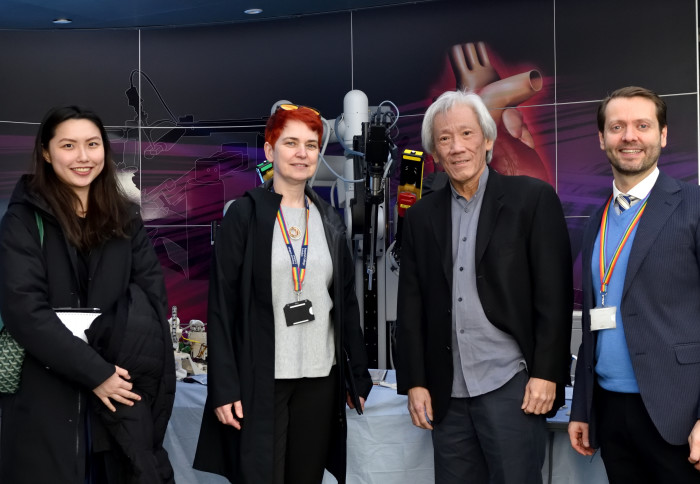Singapore High Commissioner visits Imperial to see medical robotics research

The High Commissioner of Singapore to the UK visited Imperial to see the College's cutting-edge medical robotics work and other collaborations.
The High Commissioner, H.E. Lim Thuan Kuan, met academics and students to discuss the increasing ways that Imperial is collaborating with partners in Singapore in areas such as health, sustainability and energy.

Imperial’s President Hugh Brady welcomed the High Commissioner to the College and reiterated the College’s ambitions to strengthen ties with Singapore.

Robotics in healthcare

The High Commissioner visited Imperial's Hamlyn Centre, led by Professor Ferdinando Rodriguez y Baena. The Hamlyn Centre is at the forefront of research in imaging, sensing and robotics for addressing global health challenges.
Professor Rodriguez y Baena talked about his Horizon2020 funded project, EDEN2020, which utilised surgical robotics to develop minimally invasive treatment in neurosurgery.
Future pandemics
Academics from the Jameel Institute and MRC Centre for Global Infectious Disease Analysis, have been collaborating with colleagues in Singapore to prepare for future global pandemics.
Imperial's Jameel Institute recently announced plans for a major new global initiative to use pioneering integrated economic-epidemiological modelling to provide critical data and analysis to inform public health decisions related to pandemic preparedness and disease outbreaks around the world.
Under the leadership of Katharina Hauck, Professor for Health Economics and Deputy Director of the Jameel Institute, the new initiative brings together epidemiologists, economists and data modellers from across Imperial, together with researchers from the World Health Organisation and Singapore’s Programme For Research In Epidemic Preparedness And Response (PREPARE).
Transition to Zero Pollution
Imperial's Vice Provost (Research and Enterprise) Professor Mary Ryan presented some of the work that Imperial is doing in sustainability and zero pollution. Imperial’s Transition to Zero Pollution initiative aims to inspire fundamental changes in areas such as the way resource is exploited, how we produce food and energy, and will help mitigate the impact of air pollution on people's health.
Imperial and Singapore
Imperial is Singapore’s top research collaborator in the UK (and top university collaborator in all Europe) by publications, with over 3,200 co-publications between Imperial and Singapore institutions between 2017-2021.
Imperial and Nanyang Technological University in Singapore have formed a wide-ranging partnership in research, education, innovation and enterprise.
The two universities are establishing the NTU-Imperial Health, Sustainability and Technology Hub, which will focus on collaborative research in fields of scientific research and development that tackle some of the world’s most pressing challenges
In 2019, Imperial and NTU won a Research England award to collaborate in healthcare and technology under the Data 4.0: leading the fourth industrial revolution with data-driven technologies including a research seed fund, PhD student mobility, and an annual PhD summer school.
Article text (excluding photos or graphics) © Imperial College London.
Photos and graphics subject to third party copyright used with permission or © Imperial College London.
Reporter
Stephen Johns
Communications Division